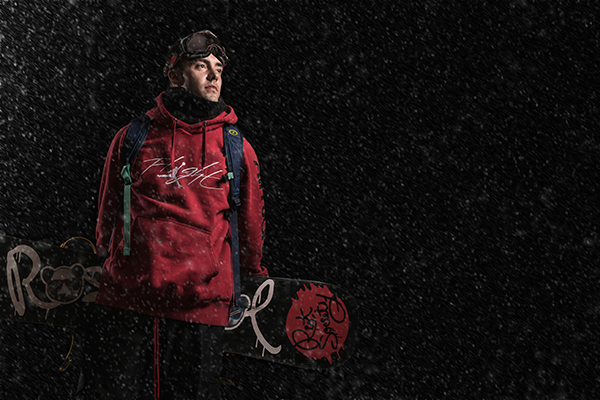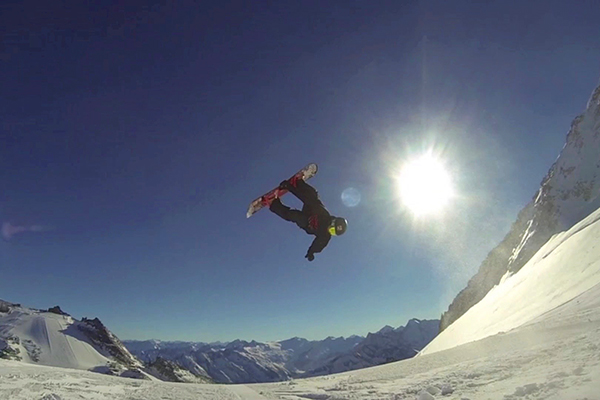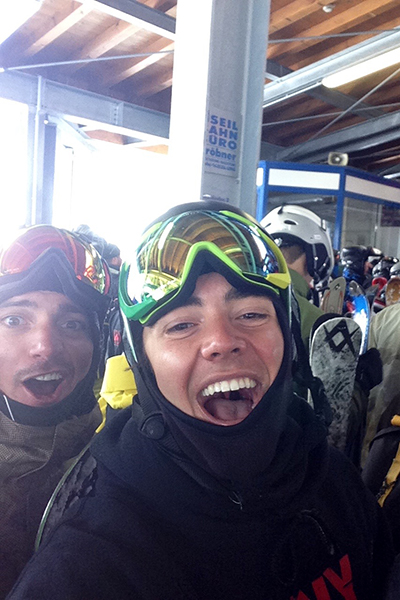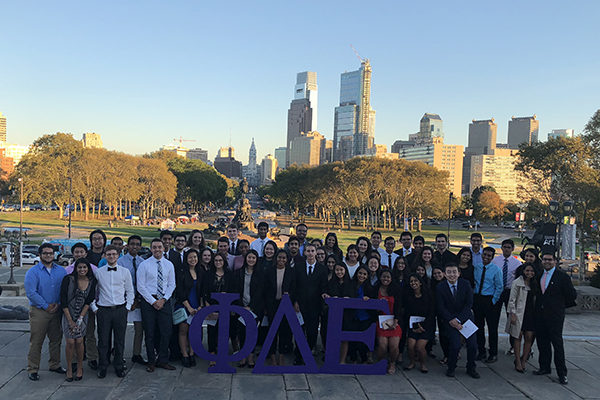Carving A New Path
By Kylie Gray
 Cutler Whitely. Photo by Jared Castaldi
Cutler Whitely. Photo by Jared Castaldi
January 11, 2018
Cutler Whitely felt the tender spot where his head hit the ice and tried to remember his teammate’s name. His snowboard had slipped out during a routine trick on the rail, sending him hurtling head-first onto the icy Colorado mountain. His brain lurched with the effects of his third concussion — temporary memory loss that day, and migraines and light sensitivity in the days that followed. Recovering in the hospital, Whitely called his mother and told her he was going to leave professional snowboarding.
“I was angry,” he says. “I had been so close to achieving childhood dreams and reaching the top level of competition. It was disheartening to lose it all so abruptly.”
Whitely’s snowboarding skills had earned him spots on the world tour and at a prestigious snowboard academy in Breckenridge, Colorado, as well as sponsorships from companies like Quiksilver and Victory Brewing, trips to Switzerland and Australia, and shots at the U.S. and European Opens.

But after a torn Achilles tendon, two broken collarbones, three fractured vertebrae and now three concussions, Whitely decided his career was no longer worth the risk to his health. He affirmed his decision when, only two weeks later, he overestimated a backflip off a 50-foot jump and fell, crumpling to earth, his goggles breaking from another head-on collision with the ice.
Though the fall didn’t send him to the hospital this time, his brushes with medical institutions around the world already amounted to something akin to medical tourism. There was the doctor’s visit in Germany, the hospital stay in Australia, and numerous encounters with physical therapists and physicians. He marveled at the different medical practices and dosing regulations in each country, not knowing then that his doctors and therapists would one day become his mentors.
Now, five years later, Whitely is a senior biology major at Drexel University, approaching injury and illness from a different side of the hospital bed.
FROM FRESH SNOW TO A FRESH PERSPECTIVE
The drive home from Breckenridge to Elverson, Pennsylvania, was a grueling 30 hours. But Whitely, carting his belongings from the past two years at the academy, appreciated the time to reflect. He’d spent the last two weeks settling finances, wrapping up mentoring sessions with younger riders and convincing his coach that he was really leaving the tour.

As he drove away from it all, he watched his Instagram following dwindle, the encouraging messages from fans disappear. He recalled the glamour of the sport he was leaving: performing jumps in front of thousands of people, receiving the VIP treatment at after-parties and feeling like a local celebrity. Though his health concerns helped him come to terms with his decision, more difficult to overcome was the crisis of identity that followed.
Whitely started snowboarding at age 4, reaping sponsorship deals at 16 and living in Breckenridge at 19, where he spent half of the year training and the other half traveling. He bunked with Olympic medalists and other athletes who understood the flow that happens when you ride every day — how easy it is to get in the zone when you’re doing something you love.
Now, as he approached his family’s farm, where the barn still housed the skateboard park he built with his father, he faced the glaring question of what he would do next.
RIDING THE RAIL
Over the months that followed, Whitely began tinkering in his father’s mechanic shop and reading voraciously, spending whole afternoons in the bookstore, where he gravitated toward textbooks on organic and general chemistry. He had seen friends suffer a range of traumatic brain injuries — multiple concussions, hemorrhages, and an accident that put one friend at risk of stroke at age 25. Although he hadn’t put much energy into his high school classes, the realization of what he could have lost spurred him back to the books.
Whitely continued to explore his interests and identity as a student at Delaware County Community College (DCCC), and it wasn’t long before he decided he wanted to become a doctor.
At the suggestion of his mother, he contacted family friend Paul Kim, MD, a leading plastic surgeon at Plastic & Reconstructive Surgery of Chester County. He also connected with a longtime customer of his father’s shop, John Reidell, MD, a Drexel College of Medicine graduate and surgeon in Glenmoore, Pennsylvania. In reaching out to Kim and Reidell, Whitely, a first-generation college student, began two of the most fruitful mentoring relationships of his life.
“The first thing Dr. Reidell said to me was, ‘I hope you’re not becoming a doctor to make money.’ But I had learned my lesson with snowboarding: Don’t be superficial,” Whitely recalls.
THE BEST MEDICINE
Time and reflection had already started to transform Whitely’s thinking about his snowboarding days, and about his life’s purpose.
“I began to realize that I wasn’t using my gifts selflessly, but selfishly,” he says. “I accepted money from sponsors and only focused on my own goals. I wanted to make myself ‘the athlete.’ From this failure, I learned two lessons: to be humble and to be more selfless.
It was with this mindset that Whitely, after a year at DCCC, transferred to Drexel, which he chose because of the co-op program. He embraced the change like every snowboarding run he’d ever attempted: “I was willing to try and fail,” he says.
His doubt gave way to a sense of belonging after only a few days, he says, noting with appreciation the open-door policy of many of his professors and advisers. Since then, Whitely has amassed diverse research and co-op experiences and more than 400 hours of volunteer work, taking full advantage of the opportunities presented by Drexel and Philadelphia. These days, he spends his time volunteering, studying for the MCAT exam and co-oping as a clinical research assistant at Thomas Jefferson University’s Marcus Institute of Integrative Health.
He has honed his career interests over the past three years at Drexel, setting his sights on the field of plastic surgery. Like his mentor Kim, he is motivated by a desire to help people heal both mentally and physically. A psychology minor, Whitely believes that the psychological effects of injury and illness are often underestimated.
 Whitley with the Drexel chapter of Phi Delta Epsilon International Medical Fraternity
Whitley with the Drexel chapter of Phi Delta Epsilon International Medical Fraternity
“I have learned that practicing medicine is not just about making the sick better,” he says, “but also about being emotionally present with the individual. Nothing beats the feeling of making people smile; that motivates me.” This same spirit drives his many volunteer activities. Whitely has volunteered for numerous organizations, including Drexel’s College of Medicine, the Salvation Army, the Ronald McDonald House and the Children’s Hospital of Philadelphia. In each of these roles, he has focused on being open and approachable, he says. The pain and worry he experienced years ago have given him an enhanced sense of empathy.
“Cutler cares deeply about patients and doing his part to support the health care staff at the various places he volunteers,” says Mary Beth Davis, PhD, a pre-health adviser at Drexel who works closely with Whitely. “He once told me that the role of a physician is ‘to keep people playing in the game of life in the best way possible.’ His dedication to that goal is heartfelt.”
Whitely is a strong supporter of his peers on campus as well. As a sophomore, he joined the founding class of Drexel’s chapter of Phi Delta Epsilon, an international medical fraternity. After noticing that some chapter members were close to failing classes, he helped turn the focus back to academics by forming a peer-mentor program. The fraternity is like a family, he says, helping younger members through the more challenging courses and participating in community service activities.
THE FUTURE UNFOLDS
Despite his successes, Whitely carries with him the spirit of the underdog. As a volunteer at the Salvation Army, he encourages kids to consider going to college by sharing his personal experiences.
“I was a snowboarder from Amish country who competed on the world stage,” he tells them. “I didn’t take rigorous science classes in high school, and I wasn’t a star student. You don’t have to be the most intelligent. Persistence is key. If you do something enough, you’ll become good or great at it.”
Whitely will apply to medical school this June, and will use a post-Drexel gap year to further grow his résumé. He plans to complete an internship in the pharmaceutical industry, continue with his research involvements at Drexel or Jefferson, and embark on medical volunteer trips to the Dominican Republic or Guatemala.
“I never expected everything to work out this way, so perfectly,” he says. “There was no need to force anything.”
Over time, he says, “it just unfolds.”